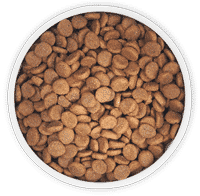Purpose
According to board-certified nutritionists, the greatest security for nutritional adequacy comes from formulating a diet and then testing it with a long-term feeding trial. However, it is reported that an estimated 80% of the pet food industry does not conduct Association of American Feed Control Officials (AAFCO) feeding trials. Some objections include, but are not limited to, formulation and verification via nutritional analyticals to be complete and balanced are accepted, reservations with using purpose-bred animals and that standard AAFCO feeding trials may not measure enough health parameters to adequately evaluate dogs’ health. Feeding trials can provide information as to deficiencies and toxicities that may happen regardless of formulation. Therefore, feeding trials should be conducted at a higher frequency.
Association of American Feed Control Officials recommends that pet food is formulated to meet AAFCO requirements, or a controlled feeding trial is conducted. These standard feeding trials are six months (26 weeks) in duration and include eight, healthy, (typically purpose-bred) dogs. Standard feeding trial guidelines leave a lot to be desired regarding a comprehensive assessment of the animal’s health while on a diet. Association of American Feed Control Officials has four, post-study blood parameters that include: hemoglobin, packed cell volume, albumin, and serum alkaline phosphatase. Weekly weigh-ins are also required. Failure or success of the trial is based upon a limited health assessment, including; 1) Two veterinary examinations to determine the presence or absence of nutritional deficiencies or toxicity; 2) Removal of dogs for non-nutritional reasons; 3) Four blood parameters need to be within normal reference range; 4) Weight loss cannot exceed 15%, individually, with no more than 10% weight loss of the group collectively.
Pets Global, Inc. has conducted and successfully completed a comprehensive in-home, AAFCO feeding trial on Zignature® Kangaroo Formula, with the addition of a full complete blood count, chemistry panel, dogs maintaining ideal body condition and muscle condition scores, three physical examinations, plasma amino acid profile, whole blood taurine, and cardiac biomarker parameters.
Scope
This rigorous in-home AAFCO feeding trial took place from October 2019 to April 2020. In accordance with the AAFCO feeding trial guidelines, seven intact English Pointers and one German Shorthaired Pointer, five females and three males, with an average age of 3.81 ± 1.55 yr, and weighing on average 24 kg, all housed in the same residence, participated in the feeding trial. Dogs were current on vaccines, in good health, had no concurrent medical conditions, and were not on any medication. Blood parameters were collected on day 0, 90, and 180. Parameters collected included complete blood count, serum chemistry panel, plasma amino acid profile, whole blood taurine, and cardiac biomarkers. Body weights and fecal scores were collected weekly.
Diet
All dogs in the study were fed the same diet prior to the start of the study. Zignature® Kangaroo Formula is formulated to meet AAFCO all life stages, including large breed puppies. This diet contains kangaroo as its primary protein source and also contains chickpeas and peas. A shipment of the dog food, from the same batch and lot code, was shipped to the residence prior to the start of the study. Dogs were fed according to their daily energy requirements. Daily energy requirements were calculated, considering activity, husbandry, and neuter status. This diet was the only source of food during the study and water was provided ad libitum. Food was offered in the morning. Daily caloric intake was calculated: (BW (kg))0.75 x 70), with the eight dogs’ activity, a daily energy requirement factor of 2.5 was used. On average the daily food amount of food offered was 1152 g; and an average kcal consumption of 3000 kcal/day, with the tested diet containing 3868 kcal/kg.
Analysis
Blood Collections
Fasted blood samples were collected via cephalic venipuncture using a sterile syringe. Thirteen milliliters (mL) of blood were collected during each blood draw per dog and was separated into six tubes. Complete blood count, serum chemistry panel, cardiac NT-proBNP, and troponin I were shipped chilled overnight, and analyzed at Idexx (Memphis, TN). Plasma was shipped frozen to the University of California at Davis, Veterinary Medicine, Molecular Bio Sciences (Davis, CA) for whole blood and plasma taurine and an amino acid profile analysis. Another sample of plasma was shipped frozen to the University of California at San Diego, Biomedical Genetics Laboratory for quantitative carnitine analysis.
The complete blood count analyzed (white and red blood cell count, hemoglobin (Hgb), hematocrit, mean corpuscular value, mean corpuscular Hgb concentration, mean concentration Hgb, red cell distribution width percentage, reticulocyte count, reticulocyte Hgb, platelet count, and complete white blood cell differential). The serum chemistry profile included (symmetric dimethylarginine (SDMA), total thyroxine (T4), glucose, total protein, alkaline phosphatase, cholesterol, calcium, potassium, blood urea nitrogen (BUN)/creatinine ratio, BUN, creatinine, albumin, alanine aminotransferase, phosphorus, chloride, bicarbonate, anion gap, globulin, total bilirubin, bilirubin unconjugated, bilirubin conjugated, aspartate transaminase, creatine kinase, sodium, sodium/potassium ratio, albumin/globulin ratio, gamma-glutamyltranserase, lipase, amylase, and lipemia and hemolysis indexes).
Physical Examinations and Observations
A licensed veterinarian performed complete physical examinations on all dogs at the beginning, midway, and the end of the study. Physical examinations included evaluation of overall health, body, and hair coat condition. Heart and lungs were auscultated, and no heart murmurs, arrhythmias, or abnormal lung sounds were noted throughout the study period. During the study, dogs were clinically observed daily. In addition, these dogs underwent rigorous daily physical training and their performance and energy levels were excellent throughout the entire study.
Summary
Complete Blood Count
Bloodwork was collected before, midway, and at the end of the feeding trial. All dogs’ complete blood count parameters were clinically normally. While some dogs experienced slightly increased white blood cell counts, they returned within normal reference range. No dog had blood parameters that were chronically elevated throughout the duration of the study nor did any dog have clinical symptoms of any illness. This study took place over the winter and early spring months and the dogs are frequently outside for training, which could contribute to transient increased white blood cell counts.
Serum Chemistries
Similar results were also seen for the serum chemistry parameters in that no dog consistently experienced parameters out of normal reference range throughout the entire study. Those that were slightly out of the reference range returned to normal during the next sample collection.
Cardiac and Thyroid Biomarkers
All dogs throughout all three time points had troponin I and NT-proBNP, two cardiac
biomarkers, within normal reference range. Troponin I is a cardiac muscle specific protein that
can be an indication of myocardial damage if elevated. NT-proBNP is a peptide that is produced
in the cardiac muscle and is released into the bloodstream in response to increased wall tension,
such as in cardiomyopathies.
This is notable, as Zignature® Kangaroo Formula is a diet that some researchers have tried to associate with dilated cardiomyopathy. However, these cardiac biomarkers would be primary indicators of cardiac dysfunction and results throughout this study were all within normal reference ranges. The thyroid hormone, thyroxine, was analyzed, and all dogs were within normal reference range except three dogs (one during baseline collections and two at the end of the study). The dogs outside of normal reference ranges were 0.1 mcg/dL low. This is not believed to be related to the current diet on this study.
Plasma Amino Acids
At baseline, two dogs were lower than normal reference range, one dog was low in total carnitine and the second dog was low in total and free carnitine. However, after being on Zignature® Kangaroo Formula for 90 days, their values returned to within the normal reference range. Conversely, at baseline one dog was higher than normal range for total and free carnitine but returned to normal after 90 days on the feeding trial.
Whole blood and plasma taurine, for all dogs during each time point, were never lower than normal range, with both increasing over the course of the feeding trial. Moreover, sulfur-containing amino acids methionine and cystine, which are precursors for taurine were within normal reference ranges throughout the study.
Physical Examination
All dogs remained healthy for the duration of the feeding trial. Dogs were noted to have a good hair and coat quality, and normal fecal scores, heart rate, and respiratory rate. All dogs maintaining an ideal body condition score (4-5/9) and had normal muscle condition scores.
Conclusion
Despite the media attention towards grain-free, legume-rich pet foods and their association to dilated cardiomyopathy and brands not conducting feeding trials, Pets Global completed a rigorous in-home AAFCO feeding trial with very successful results. All dogs on the feeding trial maintained ideal body and muscle condition scores, had normal healthy bloodwork results over three time periods, and had normal stool quality and fecal scores. Interestingly, the plasma and whole blood taurine concentrations increased as the dogs were eating Zignature® Kangaroo Formula, suggesting this brand’s feeding trial did not contribute to any negative health conditions, including dilated cardiomyopathy, and in fact all dogs on the study thrived on the diet as evidence of their physical performance during their activities and training throughout this six month study.
Study coordinated and conducted under the guidance of:
Bradley Quest, DVM Principal Veterinarian, BSM Partners, LLC
Stephanie Clarke, PhD, CVT Research and Development Manager, BSM Partners, LLC















